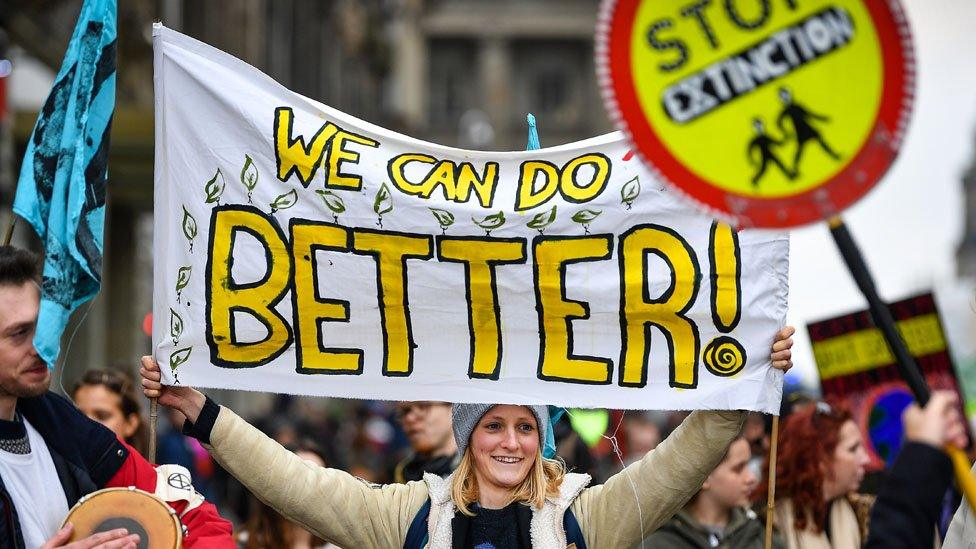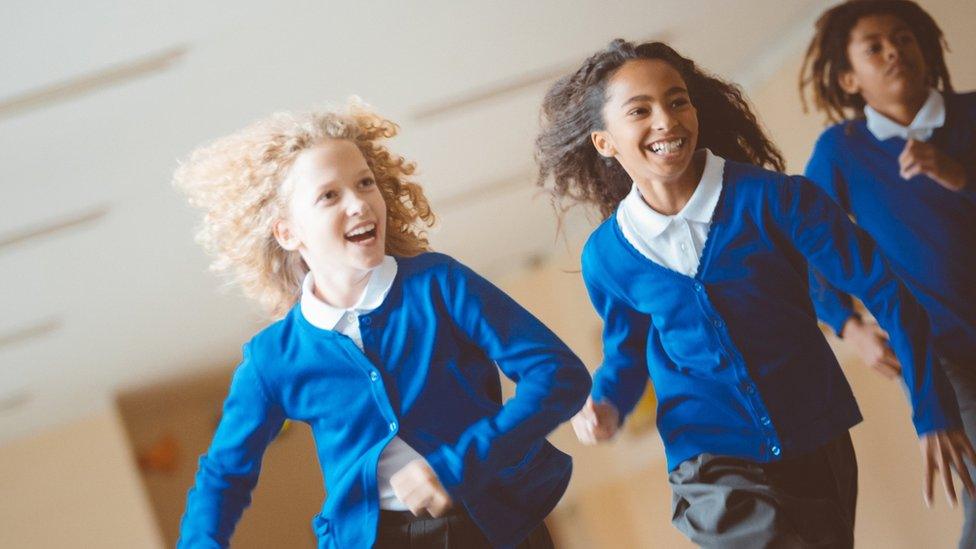The primary school teacher taking fun lessons beyond the classroom
- Published
Mr Minchin says learning about the environment is too important to be confined to the classroom
There's rarely a dull moment in Blair Minchin's classroom - where fun is a mandatory ingredient for his lesson plans.
But the 31-year-old, who began his career in law before switching to primary education, has also been delivering inventive tutorials online.
Having turned to video blogging to share his ideas about teaching, Mr Minchin creates handy clips about his own lesson plans, craft projects or useful tips for teachers.
They are now watched by thousands of people and he receives messages from welfare programmes, social workers and after-school clubs all asking for ideas.

Allow X content?
This article contains content provided by X. We ask for your permission before anything is loaded, as they may be using cookies and other technologies. You may want to read X’s cookie policy, external and privacy policy, external before accepting. To view this content choose ‘accept and continue’.

He said: "I started doing videos last year, mainly because I'd tried blogging but never really found the time. It's going really well.
"I thought it was a good way to share practices. I've found reading other teacher blogs useful but it's difficult to visualise.
"I feel school should be fun. A minority of kids don't have a happy childhood outside of school so we should make it happy in school."
Inside the classroom, Mr Minchin is able to help pupils understand complicated subjects that adults often struggle with, by using visual tools and a bit of creativity.
After one lesson his pupils were able to explain the basics of income tax using toy coins and a series of paper pockets, while in another he explained physics using a bow and arrow made of ice lolly sticks.

Allow X content?
This article contains content provided by X. We ask for your permission before anything is loaded, as they may be using cookies and other technologies. You may want to read X’s cookie policy, external and privacy policy, external before accepting. To view this content choose ‘accept and continue’.

However, his most popular clip was a poem he wrote about zero tolerance towards bad behaviour in the classroom - and how teachers should think twice before disciplining troubled children.
He said: "Behaviour is a massive issue at the moment - I've heard of restorative practices that are used in jail increasingly used in classrooms.
"Schools are worried they don't have time to spend on children because they have so much to pack in, so you end up with zero tolerance policies and things like isolation booths. I feel this is killing kids' aspirations and also giving them message the school doesn't really care for them.
"I'm a huge advocate for sticking with it. My class are performing really well - in the first year of Scottish National Standardised Assessments many did better than expected.
"But it's not me alone - we have a great support for learning team who have similar practice to mine as well. Academically they are achieving, but what we are very good at is pupil-led initiatives."

Allow X content?
This article contains content provided by X. We ask for your permission before anything is loaded, as they may be using cookies and other technologies. You may want to read X’s cookie policy, external and privacy policy, external before accepting. To view this content choose ‘accept and continue’.

On an average day Mr Minchin will take his P6 or P7 class at Victoria Primary in Newhaven through lessons on English, maths, science, art and music.
But rather than lecturing from textbooks, he says his lesson structures are determined by the pupils themselves.
He said: "Starting with choice is really important so for example, when we do reading tasks and I ask for a summary we'll do them in different styles - newspaper articles, comic strips, adverts, invitations or instructions.
"In mathematics I get kids to show me their understanding using concrete materials - cubes and diagrams - before moving on to other things.
"What doesn't work for my class is sitting still. It's about giving them scope and breadth on their learning."

Allow X content?
This article contains content provided by X. We ask for your permission before anything is loaded, as they may be using cookies and other technologies. You may want to read X’s cookie policy, external and privacy policy, external before accepting. To view this content choose ‘accept and continue’.

One of Mr Minchin's favourite areas to teach is STEM (science, technology, engineering and mathematics) - so much so, he made a video for BBC Scotland on his top tips for helping the environment.
His class is often asked to think about the practical uses of STEM - sometimes that can be as simple as how to make a plastic bag levitate using static energy from a balloon, external, or the different trajectories you can achieve using a home-made bow and arrow.
His pupils also used raise money for the school by building shelves and flower boxes out of old palettes.
These are exercises that Mr Minchin believes could help future-proof their learning.
Mr Michin said: "There's a real debate which has been going on for while between a skills-based or a knowledge-based curriculum. Some people believe we should be drilling facts and figures and only once kids grasp knowledge then they can create and evaluate.
"But I don't feel there's any way of knowing the exact knowledge that kids will need for the future. There's a worry about the future in the way that technology and automation is going and nobody is entirely sure what our kids are need to be prepared for.
"I think we can make good guesses as to the skills they'll need like problem solving and collaborating - so we need to focus on those skills."
As schools across Edinburgh begin a new term on Wednesday, Mr Minchin's efforts were welcomed by Councillor Ian Perry, education convener at the City of Edinburgh Council.
He said: "Teaching is all about inspiring our young people to learn and Mr Minchin definitely knows how to do that.
"He's got some great ideas on making lessons fun and informative on diverse subjects such as music, science - and even income tax! I'm sure all his pupils look forward to coming into his classes every day."
- Published12 August 2019

- Published13 August 2019
